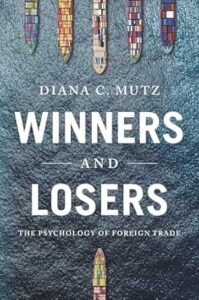
I recently mentioned Diana Mutz’s book Winners and Losers: The Psychology of Foreign Trade and was struck by how people think of international trade as a competitive activity. Of course, I really shouldn’t be surprised by this. Over 30 years ago, Paul Krugman’s excellent essay “Competitiveness: A Dangerous Obsession” was published in Foreign Affairs. In it, Krugman laments that so many people think that “the United States and Japan are competitors in the same sense that Coca-Cola competes with Pepsi”, and as an example of this misguided thinking quotes President Bill Clinton as saying that a country is “like a big corporation competing in the global marketplace.”
Recently, co-blogger David Henderson published an article for Hoover asking if he is subsidizing Safeway:
Am I subsidizing Safeway? Why would I ask? Here’s why. My wife and I spend at least $400 a month at Safeway. Safeway doesn’t buy anything from us. So, our monthly trade deficit with Safeway is at least $400. And, in Trump’s view of the world, a trade deficit equals a subsidy. By Trump’s reasoning, yes, I am subsidizing Safeway.
Let me borrow this framing and apply it to competition and trade. My wife and I spend many hundreds of dollars per month at Target on groceries and various household items. Now, here’s the question – in doing this, am I engaging in “competition” with Target? By purchasing things from them, have I become their competitor?
Obviously not – that would be absurd. I am not Target’s competitor, I am Target’s customer. Target is not competing with me – Target competes with HyVee, Lunds & Byerlys, Trader Joes, Amazon, and a variety of other stores for me.
When Americans engage in trade with Canada, those are acts of customers purchasing from producers. It is simply not the case that “America” is “competing” with “Canada” when Americans and Canadians trade with each other, any more than I am competing with Target or Amazon when I trade with them. There is competition for trade, but trade itself is not a competition. It’s mutually beneficial cooperation.
Now, of course, there is an element of international trade that does involve competition – the aforementioned competition for trade. If I want to buy lumber for my construction company, I might buy lumber from an American company or I might buy imported Canadian lumber. As a result, the American lumber company must compete with the Canadian company for me. But this is not a bad thing! After all, domestic trade also involves this same kind of competition.
The benefits of competition don’t stop being benefits when it occurs across national borders. Particular American companies might be unable to compete and lose money and go out of business. This is true, and it can be devastating for those who lose their businesses and jobs. But this is also the case when American companies compete with each other! American companies have gone out of business as a result of domestic competition – that obviously doesn’t mean such competition is bad overall, or that the American economy would benefit if policymakers decided to prevent that competition from occurring.
Apple has to compete with both Microsoft, an American company, and with Samsung, a Korean company. It’s simply not the case that the results of their competition with Samsung is bad for Americans but the results of their competition with Microsoft is good. It’s good in both cases, and for the same reasons.
But “America” is not “competing” with “South Korea” when Americans buy Samsung phones or Koreans buy a new iPhone, any more than I am competing with Target when I make my weekly provisions run there. International trade can increase the scope of competition, but trade itself is not a competition, nor are nations competitors when the citizens of those nations trade with each other.

